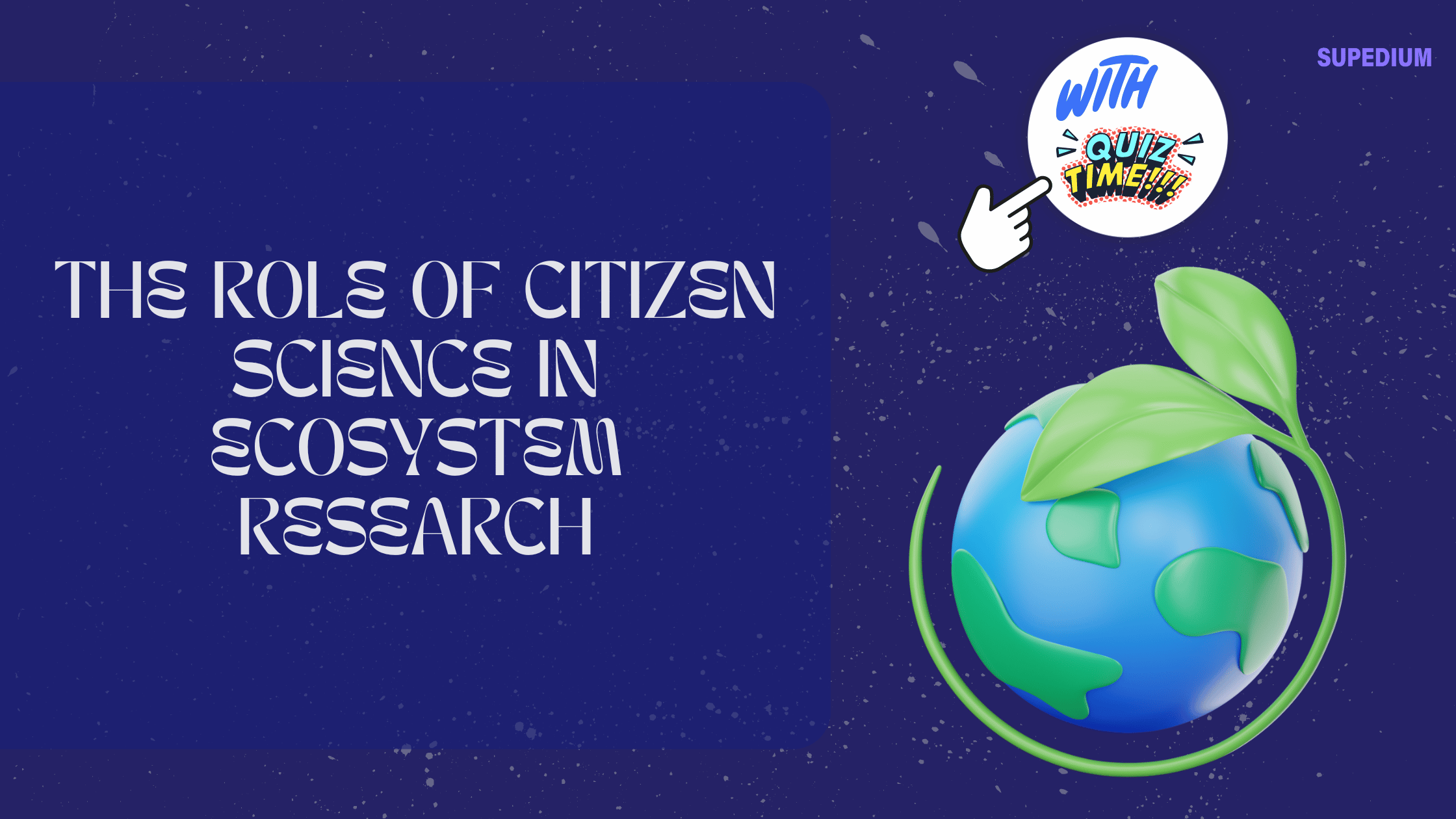Table of Contents
![]()
Introduction
Definition of Citizen Science
Citizen science involves the participation of the general public in scientific research, bridging the gap between professional scientists and non-experts. This collaboration allows individuals from various backgrounds to contribute to scientific studies, often in their own communities or areas of interest. By engaging with citizen science, people can actively contribute to and influence scientific knowledge and practices.
Importance of Ecosystem Research
Ecosystem research is crucial for understanding the complex interactions between organisms and their environments. This knowledge is essential for addressing pressing environmental issues such as climate change, habitat destruction, and biodiversity loss. Ecosystem research informs conservation strategies, supports sustainable practices, and helps policymakers make informed decisions.
Purpose of the Outline
This article aims to explore how citizen science contributes to ecosystem research. We will examine the historical context, mechanisms, benefits, challenges, and future directions of citizen science in this field. By highlighting case studies and discussing innovations, we will demonstrate the significant role of citizen science in advancing our understanding of ecosystems.
Historical Context and Evolution
Origins of Citizen Science
Citizen science has roots in early natural history and astronomy, where amateur enthusiasts contributed to scientific observations and records. Historically, contributions from non-professionals were valuable, although often informal. The modern concept of citizen science began to take shape in the 20th century, with structured programs and projects involving public participation becoming more prevalent.
Growth in Ecosystem Research
In recent decades, citizen science has experienced significant growth in ecosystem research. Advancements in technology, such as smartphones and the internet, have facilitated wider public involvement. These developments have enabled large-scale data collection and engagement from diverse geographical locations, making citizen science a valuable tool for understanding and monitoring ecosystems.
Mechanisms of Citizen Science in Ecosystem Research
Data Collection
Citizen scientists contribute to data collection in various ways, from monitoring species populations to tracking environmental changes. For instance, volunteers may participate in bird watching programs, record sightings, and report data on bird migrations. Similarly, people can help document plant species, track pollution levels, or monitor weather patterns, providing valuable information for ecological studies.
Data Analysis
The data collected by citizen scientists is often used in conjunction with professional research. Crowdsourced data can be analyzed to identify trends, patterns, and anomalies in ecosystems. Many citizen science projects employ specialized platforms to aggregate and analyze data, facilitating the integration of public contributions into larger ecological databases and research efforts.
Reporting and Dissemination
Once data is collected and analyzed, results are shared with both the scientific community and the public. This dissemination helps in making research findings accessible and understandable, raising awareness about ecological issues. Additionally, the insights gained from citizen science projects can influence policy decisions and conservation strategies, making a tangible impact on environmental management.
Benefits of Citizen Science in Ecosystem Research
Increased Data Collection Capacity
Citizen science significantly expands the capacity for data collection, covering larger geographic areas and longer time periods than would be possible with professional researchers alone. Volunteers can gather data from remote or under-researched areas, providing a more comprehensive view of ecosystems and their dynamics.
Enhanced Public Engagement and Education
Engaging the public in scientific research raises awareness about environmental issues and fosters a deeper understanding of ecological concepts. Participants often gain knowledge about local ecosystems and develop a sense of stewardship toward the environment. This increased engagement can lead to more informed and proactive citizens who support conservation efforts.
Cost-Effectiveness
Citizen science projects often reduce research costs by leveraging the voluntary contributions of participants. This cost-effectiveness allows researchers to allocate resources more efficiently and pursue larger-scale studies. Additionally, community resources and local knowledge can enhance the quality of research and provide insights that might otherwise be overlooked.
Challenges and Limitations
Data Quality and Accuracy
One of the primary challenges of citizen science is ensuring data quality and accuracy. The skill levels and training of participants can vary, leading to potential inconsistencies in data collection and reporting. To address this, many projects provide training and use standardized protocols to improve data reliability and facilitate validation processes.
Project Management and Coordination
Effective project management is crucial for the success of citizen science initiatives. Coordinating a large number of volunteers requires clear communication, support, and organization. Balancing scientific rigor with volunteer engagement can be challenging, as projects must maintain high standards while keeping participants motivated and involved.
Ethical and Privacy Concerns
Citizen science projects must address ethical and privacy concerns, particularly when handling sensitive information or involving vulnerable communities. Ensuring that participant data is handled respectfully and that projects are conducted equitably is essential for maintaining trust and integrity in citizen science efforts.
Case Studies
Project 1: eBird
eBird is a global citizen science project that allows bird watchers to record and share observations of bird species. Managed by the Cornell Lab of Ornithology, eBird has collected millions of bird sightings, providing valuable data on bird populations, migration patterns, and habitat use. This project has significantly contributed to our understanding of avian ecology and supports conservation efforts worldwide.
Project 2: iNaturalist
iNaturalist is a platform that enables users to document and share observations of plants, animals, and fungi. By uploading photos and identifying species, participants contribute to a growing database of biodiversity information. The data collected through iNaturalist supports research on species distribution, conservation priorities, and ecological interactions.
Project 3: Global Coral Reef Monitoring Network (GCRMN)
The GCRMN involves volunteers in monitoring coral reef health around the world. Participants assess reef conditions, such as coral cover and fish populations, contributing to a global database on reef ecosystems. This information helps track changes in coral reef health and supports conservation and management efforts.
Future Directions and Innovations
Emerging Technologies
Advancements in technology are expanding the possibilities for citizen science in ecosystem research. Mobile apps, online platforms, and remote sensing technologies enable more efficient data collection, analysis, and dissemination. Innovations such as artificial intelligence and machine learning are enhancing data processing and pattern recognition, further increasing the impact of citizen science.
Expanding Participation
Efforts are underway to increase diversity and inclusion in citizen science projects. By engaging a broader range of participants, projects can benefit from diverse perspectives and local knowledge. Developing new models for collaboration and engagement can help ensure that citizen science remains accessible and impactful for all.
Policy and Institutional Support
Institutional and governmental support is crucial for the continued success of citizen science. Encouraging policies and frameworks that integrate citizen science into mainstream research can enhance its effectiveness and sustainability. Supporting citizen science initiatives through funding, recognition, and collaboration can help maximize their contributions to ecosystem research.
Conclusion
Summary of Key Points
Citizen science plays a significant role in ecosystem research by expanding data collection capabilities, enhancing public engagement, and providing cost-effective solutions. Despite challenges related to data quality, project management, and ethical considerations, citizen science offers valuable contributions to our understanding of ecosystems and supports conservation efforts.
Final Thoughts
As we face increasing environmental challenges, citizen science provides a powerful tool for advancing ecological research and promoting environmental stewardship. By embracing innovations and fostering broader participation, we can continue to harness the potential of citizen science to address pressing ecological issues and create a more sustainable future.






Be the first to comment